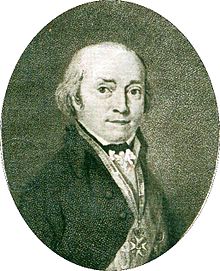Christian von Haugwitz
Christian August Heinrich Curt von Haugwitz , from 1786 Count von Haugwitz (born June 11, 1752 in Peuke near Oels , Lower Silesia , † February 9, 1832 in Venice , Italy ) was a Prussian lawyer, statesman and diplomat.
Life
Haugwitz, from the old Haugwitz family , who were wealthy in Moravia (Catholic line) and Silesia (Protestant line) , studied law in Halle and Göttingen, spent several years in Italy, lived on his estates in Silesia for ten years and became a member of the Silesian estates Elected general landscape director in 1791. In 1774 he was accepted as a traveling cavalier in the Leipzig Freemason Lodge Minerva to the three palms . In 1775, along with two Stolberg brothers, he belonged to the society that Goethe joined on their trip to Switzerland.
After much reluctance, he allowed himself to be persuaded by Friedrich Wilhelm II to enter the Prussian civil service and in 1792 was appointed envoy in Vienna. Appointed as cabinet minister to Berlin at the end of 1792 and primarily entrusted with tasks in foreign policy, he concluded the Hague Subsidiary Tract Council on April 19, 1794 and through his influence enforced the peace of Basel with France (April 5, 1795).
As a reward for this he received goods worth 200,000 thalers. From 1802 he managed the Ministry of Foreign Affairs all by himself. However, he increasingly left the design of foreign policy to his confidante Johann Wilhelm Lombard , who in turn pursued a pro-French policy. When in 1803 the French Hannover occupied and thereby violated the neutrality of the northern German states to put Haugwitz after the king had rejected the demand of the clearance or declaration of war which he has applied to France, back in August 1804 to his estates, to which Karl August von Hardenberg to took his place.
In 1805 he was reappointed to submit an ultimatum to Napoléon , but was put off until the emperor had won the decisive victory in the Battle of Austerlitz on December 2 , whereupon Haugwitz was forced to enter into the Treaty of Schönbrunn on December 15 , ceded Ansbach, Kleve and Neuchâtel to France through the Prussians and received Hanover in return.
A new treaty, signed by Haugwitz in Paris on February 15, 1806, completely isolated Prussia and brought about a break with England. Nevertheless, Haugwitz remained at the top of the business.
Ultimately, Haugwitz could no longer prevent the break with France, which resulted in the war of 1806, which ended with the extensive collapse of Prussia. Haugwitz was initially at the headquarters, then accompanied the king to East Prussia, received his farewell in Osterode in November 1806 and withdrew into private life.
In 1811 he was appointed curator of the University of Breslau, but from 1820 he lived mostly in Italy, alternately in Venice, Padua and in a villa near Este , and died in Venice in 1832. He tried to justify his policy in the text Fragment des mémoires inédits du comte de Haugwitz (Jena 1837). He was buried near the Villa Contarini near Este .
family
His parents were the Württemberg Chamber of Commerce President Karl Wilhelm Friedrich von Haugwitz (1704–1786) heir to Krappitz and Steinau, Peuke and Pannwitz and his wife Johanna Sibylle von der Marwitz (1719–1801) from the Sellin family. He married Johanna Katharina von Tauentzien (* 1755) in Lossow in 1777, the daughter of General Friedrich Bogislav von Tauentzien . The couple had several children including:
- Paul (1791–1856), Prussian lieutenant colonel, adjutant to General Tauentzien von Wittenberg and General Field Marshal Yorck von Wartenburg, and writer
- Catharina (May 1792–1839) ⚭ Count Hans Wilhelm Adolf von Kalckreuth (1766–1830), Prussian Legation Councilor
And with Rosa Richter:
- Rosamunde Ernestine Pauline (1804–1883) ⚭ Georg Benjamin Mendelssohn (1794–1874),
literature
- Johann Minutoli: The Count of Haugwitz and Job of Witzleben . Berlin 1844 digitized
- Skalweit, Stephan: "Haugwitz, Heinrich Christian Kurt Graf von". In: New German Biography (NDB). Volume 8, Duncker & Humblot, Berlin 1969, ISBN 3-428-00189-3 , p. 94 f. ( Digitized version ).
- Heinrich von Sybel : Haugwitz, Christian Graf von . In: Allgemeine Deutsche Biographie (ADB). Volume 11, Duncker & Humblot, Leipzig 1880, pp. 57-66.
- Genealogical paperback of the German count's houses 1848 p. 277f ; 1869, p. 248f
Web links
- Masonic Lodge Minerva to the three palms Leipzig
- Haugwitz at Berliner-Klassik
| personal data | |
|---|---|
| SURNAME | Haugwitz, Christian von |
| ALTERNATIVE NAMES | Haugwitz, Christian Heinrich Kurt von; Haugwitz, Christian August Heinrich Curt von |
| BRIEF DESCRIPTION | Prussian statesman and diplomat |
| DATE OF BIRTH | June 11, 1752 |
| PLACE OF BIRTH | Oels , Lower Silesia |
| DATE OF DEATH | February 9, 1832 |
| Place of death | Venice |

